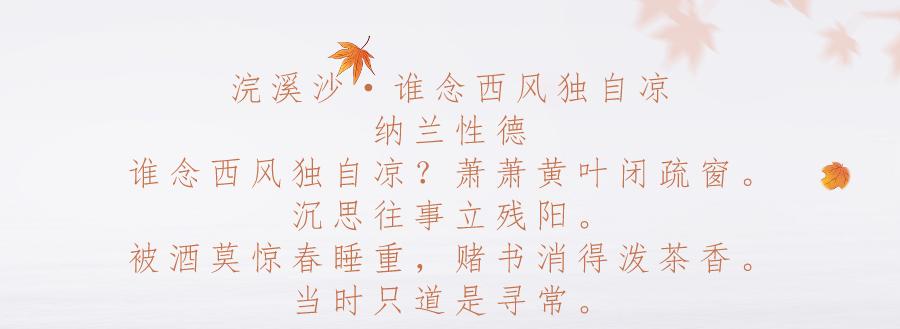
Huan Xi Sha who reads the west wind alone cool
Naranjande
Who reads the west wind alone cool? Xiao Xiao yellow leaves closed the window. Contemplate the past and stand in the sun.
Frightened by the wine Mo Chun slept heavily, gambling books to pour tea aroma. At that time, only the Tao was commonplace.
Autumn has arrived, the cold wind is blowing, I bear the cold alone, but no one will ever care about me again.
The dead leaves of the old trees outside the house, as the autumn wind beat on the ground, I could only close the window, and I could not bear to look.
A man sits on a wooden chair reminiscing about the past, the dappled years glittering in tears, and the afterglow of the setting sun is like the back of a happy one.
I remember that whenever you were drunk and drowsy in the spring, you whispered softly.
I still remember that every time we bet on the words and guessed the book, the room was full of tea.
Piles of small things, like it happened yesterday, your smile seems to be right in front of you. However, now I am left alone, at that time I only thought it was a trivial matter, who wants to be a memory today?
In the thirteenth year of the Kangxi Dynasty (1674), Nalan married Lu Shi, the daughter of Lu Xingzu, the governor of Liangguang. In the sixteenth year of the Kangxi Dynasty, Lu Shi died in childbirth, and the sound of Nalan's mourning rose from the air and became the peak of the "Drinking Water Words".
This poem was composed by Naranjande in memory of his deceased wife Lu Shi. The words speak of today's bitterness, that is, those ordinary past events cannot be reproduced, the dead wife cannot be reborn, and the pain of the soul will never be restored. There are nostalgia, regret, sorrow, sorrow, and complex feelings.
The word Naranjande is the contemplation of the here and now, the lower is the memory of the past; the upper is the loneliness of the naranjande here and now, and the lower is the short and boundless joy of Naranjand and his wife in the short three years of the past.
Shang Yan wrote about the loneliness and desolation after the bereavement of his wife.
On the occasion of the late autumn, if in the past, the wife would urge the author to add clothes to avoid getting cold and getting sick. But at this time this year, she has been separated from her wife's yin and yang, and she can no longer come to make a bed and fold the quilt for the author, and care about him warmly.
Under the strong autumn wind, the dead yellow leaves floated into the house through the windows, adding a layer of autumn to the author's heart. So he closed the window and blocked the yellow leaves that touched the nerve out of the window. When the window is closed, the yellow leaves naturally will not bother again, but the author is completely isolated from the outside world, so he is even more lonely. He was alone in the empty house, letting the sunset shine obliquely on him, dragging the figure long and long. At this time, his whole body and mind were immersed in the memories of the past.
Xia Yan naturally wrote the lyricist's recollection of the past.
Recall two fragments of his wife's life at that time: the first sentence writes that the wife is meticulous and caring for herself, she has drunk too much wine in the spring, her sleep is heavy, her wife is afraid of disturbing his good dreams, the movements and speeches are gentle, and dare not be alarmed; the latter sentence writes about the joy of the couple's elegant life, the husband and wife bet on the book with tea, pointing out to each other that something is in a certain page and a certain line of a certain book, who is right to raise a cup of tea for fun, so that the tea is spilled on the ground, and the room is full of tea fragrance.
Naranjand could only turn all his grief and helplessness into the last sentence, "At that time, only the Tao was common." These seven words are all blood and tears, and the force penetrates the back of the paper. Before Lu Shi was born, life was the greatest happiness, but he was unaware, only said, it should be so, ordinary. The implication is remorse.
At that time, only the Tao was commonplace, there were many such people and things in life, when everything was still around, it would only feel ordinary, and I would feel at ease that these were just daily life, always lucky, always thinking that it could be long and long.
But when the people and things around us are gone, they are full of regrets, and those small things that were once inconspicuous and unattended, those who accompany us day and night, have now become the softest places in our hearts. As soon as I think of this, my heart will be infinitely bitter, and the tears will unconsciously wet my cheeks.
At that time, only the Tao was ordinary, and it was often these ordinary things that we were most likely to ignore, and we were most likely to dismiss them, but what was ordinary was really indispensable in our lives.
Ordinary is happy, ordinary is worth cherishing, may we all be able to guard the ordinary in life, love the people and things around us, do not wait until it is missed, the Tao is ordinary.